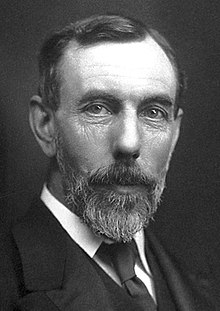William Ramsay | |
|---|---|
 Ramsay in 1904 | |
| Born | 2 October 1852 Glasgow, Scotland |
| Died | 23 July 1916 (aged 63) High Wycombe, England |
| Nationality | British |
| Alma mater | University of Glasgow (1866–69) Anderson's University, now University of Strathclyde Glasgow (1869)[1] University of Tübingen (PhD 1873) |
| Known for | Discovering noble gases Ramsay grease |
| Awards | Leconte Prize (1895) Barnard Medal for Meritorious Service to Science (1895) Davy Medal (1895) Longstaff Prize (1897) Nobel Prize in Chemistry (1904) Matteucci Medal (1907) Elliott Cresson Medal (1913) |
| Scientific career | |
| Fields | Chemistry |
| Institutions | University of Glasgow (1874–80) University College, Bristol (1880–87) University College London (1887–1913) |
| Doctoral advisor | Wilhelm Rudolph Fittig |
| Doctoral students | Edward Charles Cyril Baly James Johnston Dobbie Jaroslav Heyrovský |
Sir William Ramsay KCB FRS FRSE (/ˈræmzi/; 2 October 1852 – 23 July 1916) was a Scottish chemist who discovered the noble gases and received the Nobel Prize in Chemistry in 1904 "in recognition of his services in the discovery of the inert gaseous elements in air" along with his collaborator, John William Strutt, 3rd Baron Rayleigh, who received the Nobel Prize in Physics that same year for their discovery of argon. After the two men identified argon, Ramsay investigated other atmospheric gases. His work in isolating argon, helium, neon, krypton, and xenon led to the development of a new section of the periodic table.[2]
- ^ Thorburn Burns, D. (2011). "Robert Rattray Tatlock (1837–1934), Public Analyst for Glasgow" (PDF). Journal of the Association of Public Analysts. 39: 38–43. Archived (PDF) from the original on 3 March 2012. Retrieved 25 November 2011.
- ^ Wood, Margaret E. (2010). "A Tale of Two Knights". Chemical Heritage Magazine. 28 (1). Retrieved 22 March 2018.